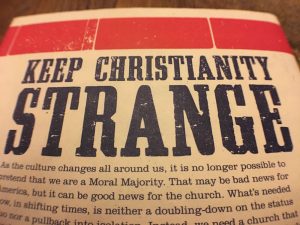I don’t know much about the refugee crisis, or why President Trump has issued an executive order to close our borders to people from Syria, Iraq, Iran, Sudan, Yemen, Lebanon, and Libya. I’ve read the executive order, but I couldn’t parse the political or social implications of it for my children. The global political situation is beyond my comprehension. I don’t understand the causes of the war in Syria. I can’t tell the difference between the good guys and the bad guys, and I’m not sure there is a difference anymore. My Twitter timeline and Facebook feed are filled with posts of varying degrees of outrage at Trump’s executive order. I don’t know whether I should be outraged, and if so how much, because, in our post-truth culture, I don’t know who to trust to explain this to me.
When the chaos and confusion of our culture swirl around me, my instinct is to lash myself to the only fixed point I know – Jesus Christ. He is my Rock, and the one on whom I can rely in distressing times. When I don’t know how to move forward, I try my best to find Jesus and just follow him. While I cannot speak to the complexities of holding political office (particularly the office of President), I believe I have something to say to my fellow Christians, particularly my evangelical brothers and sisters.
The world is a dangerous place. It has always been this way, though some of us in America have not had to experience the kind of imminent threats that people in Syria deal with today. But the reality is that death, disease, and suffering are never far away. Whether the threat is from a microscopic virus or a bloodthirsty warlord, there is much in our world to make us afraid. Fear is, more often than not, the rational choice.
Fear is not an option for those who follow Jesus.
But it is not a choice that Christians are permitted to make. Fear is not an option for those who follow Jesus. All of life is an act of discipleship, therefore all of life must be a demonstration of the agape love Jesus exemplified in his life, and most completely at the cross. The Scriptures are clear: “Perfect love drives out fear.” (1 John 4:18) Our own love may be imperfect, but if the Holy Spirit dwells within and among us, then so does the perfect love of God. The Church is the place where fear does not get to have a voice because the melodies of God’s love are too loud, too strong, too catchy.
As the people of God, we do not have a choice between fear and love. We are compelled to love and commanded to reject fear. Fear must never be our rationale for any decision, large or small. We cannot support public policy that rejects refugees because one of them may (by the tiniest of chances) be connected to a terrorist organization. It is impossible to faithfully follow Jesus by carrying your cross while at the same time deny hospitality and refuge to those in need because you are afraid that they might mean you harm. Jesus knew what the Romans were going to do to him, and he overcame the fear he expressed in the Garden by steeling himself toward the cross. Why did he do this? Because he loved the world – even the Roman soldiers who crucified him!
Perhaps there really are terrorist agents trying to sneak into this country through the refugee process. Jesus didn’t command us to be unwise or naive. But in the absence of clear information, we must not assume the worst of others. We must love without fear. We must welcome the stranger; after all, how do we know we aren’t secretly entertaining angels? We must provide for the needy, because as Jesus himself said, when we do this we are doing it for him. We must love others and entrust ourselves to God.
I admit, that’s not a very good public policy. But I’m a pastor, not a politician. My primary citizenship is in the kingdom of God, not the United States of America. I’m not calling on the state to enact a more Christian policy. I’m calling on the Church to act more Christianly. Don’t be afraid, Church. Jesus has conquered our greatest enemy, death itself. There is no one, then, that we should fear; but there is everyone that we can love.

